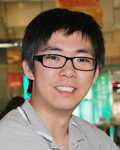|
 |
|
Zhao Bowen (IC) |
University students are expected to enjoy campus life. But for more than one year, 19-year-old Zhao Bowen has assumed the leadership of a research team probing one of the world's toughest problems—the genetic basis for human IQ.
In 2009, Zhao, still a student in his third year at the High School Affiliated to Renmin University of China, made a decision which would make a huge difference in his life. He decided to quit school and give up the college entrance examination. He made up his mind to join the Beijing Genomics Institute (BGI) in Shenzhen, China's largest genome and bioinformatics analysis center, to be a full-time researcher to engage in the world-changing project of genetic code analysis.
On June 28, 2010, The Washington Post reported, "Centuries after it led the world in technological prowess—think gunpowder, irrigation and the printed word—China has barged back into the ranks of the great powers in science. With the brashness of a teenager, in some cases literally, China's scientists and inventors are driving a resurgence in potentially world-changing research." The teenager here mentioned is Zhao.
The childish-looking Zhao, who was dubbed "China's Bill Gates" by his boss Wang Jian, President of BGI, is now the leader of the genome analysis of human cognitive ability. Since 2010 he has led a research team comprised of more than 20 domestic and foreign experts in mathematics, physics and psychology to study how the genome has influenced intellectual differences in humans. Now his team is sampling 1,000 Chinese students with above average IQs, 145 and above, and comparing their genomes with those of an equal number of randomly picked ordinary students.
Zhao's team began operation in the middle of 2010. After The Washington Post report, Zhao and his project aroused the interest of many scientists, professors and research fellows from both China and abroad. They contacted Zhao and showed their willingness to join the project. "I was so surprised. I never thought my project was so attractive," Zhao said. Some have become full-time researchers on the project while others have worked part-time for the project. In addition, several U.S. research groups have also contacted him for collaboration.
Zhao is not only responsible for the scientific research but also handles administrative affairs such as signing contracts with partners and contacting government organs. In addition, because the researchers are located around the world, Zhao's main task is coordinating the whole project. He organizes telephone conferences or Internet meetings at regular intervals to make sure the team stays focused.
All team members are under the command of the 19-year-old boy. But Zhao doesn't feel too much pressure. "The reason why they all follow my orders is that I get the money. All research funds are under my control," Zhao said jokingly.
Zhao was different from his peers from childhood. His way of doing things, in adults' eyes, was always seen as unusual and unconventional.
Zhao is fascinated with scientific research, but he never participates in scientific contests. He said he doesn't want to prove himself through awards or certificates. Zhao is also a good piano player. However, he said, "It is not a kind of specialty. It's just my hobby and my way of relaxing."
When asked about his incredible decision to quit school two years ago, Zhao felt relaxed and said with a smile that he is an unconventional student, so he chose an alternative life.
| 